2023年中考英语复习之动词的形式以及一般时态的讲解课件(42张PPT)
文档属性
| 名称 | 2023年中考英语复习之动词的形式以及一般时态的讲解课件(42张PPT) |
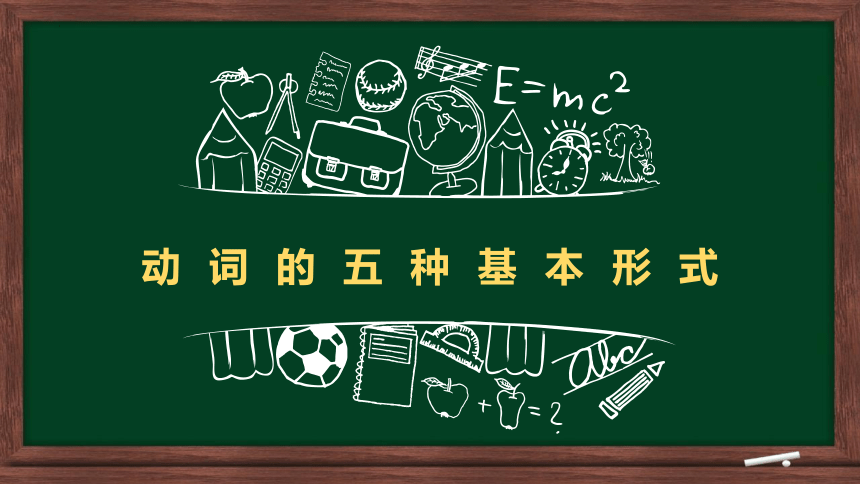
|
|
| 格式 | pptx | ||
| 文件大小 | 649.5KB | ||
| 资源类型 | 教案 | ||
| 版本资源 | 通用版 | ||
| 科目 | 英语 | ||
| 更新时间 | 2023-08-13 15:14:31 | ||
图片预览

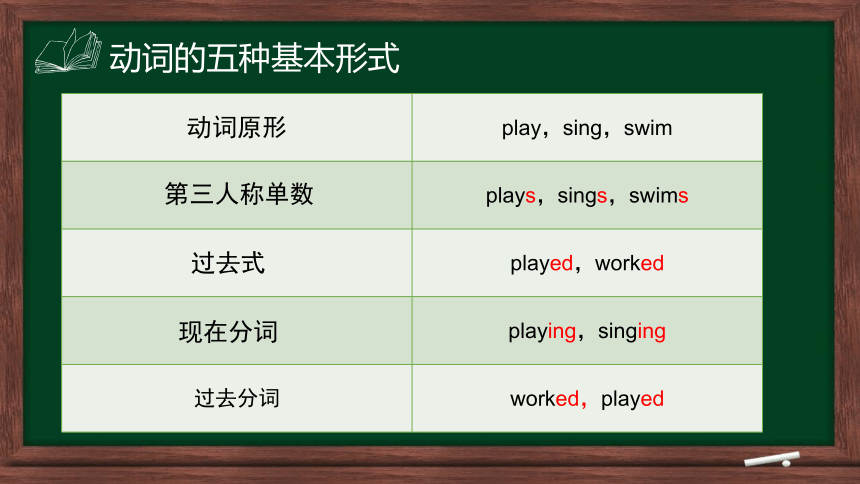
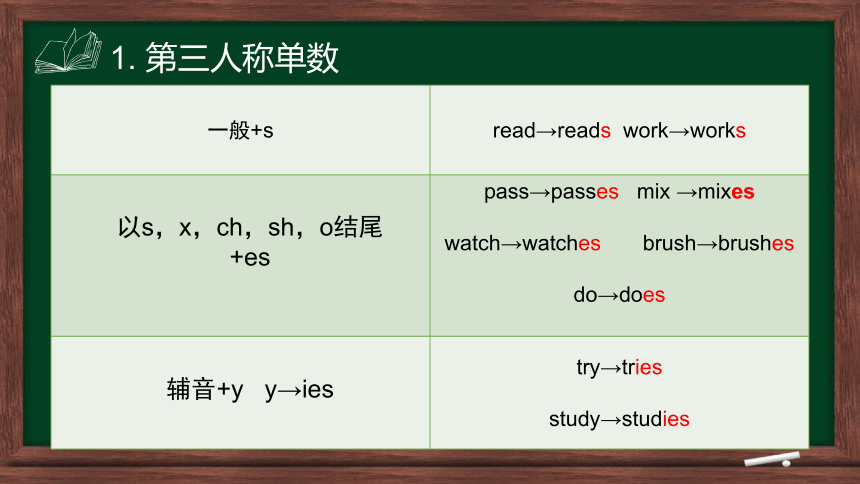
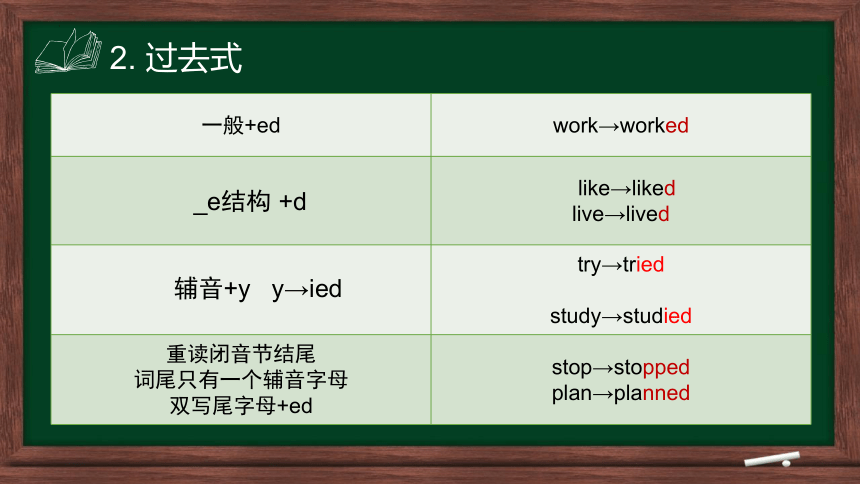
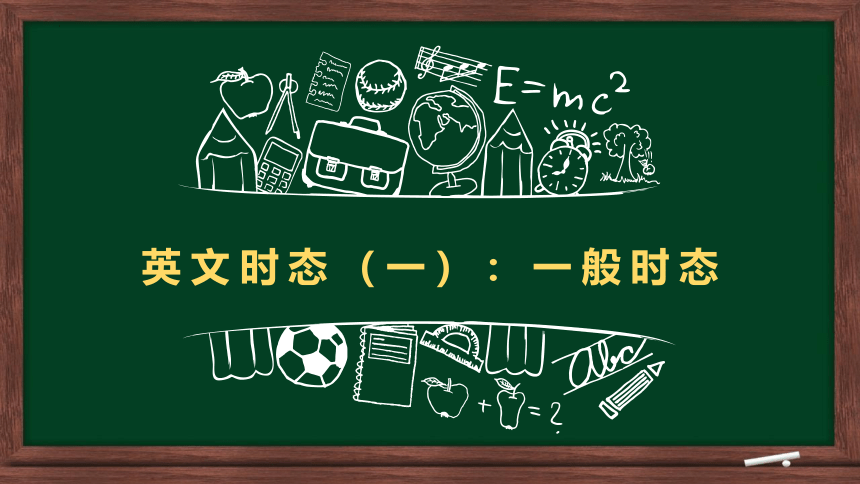
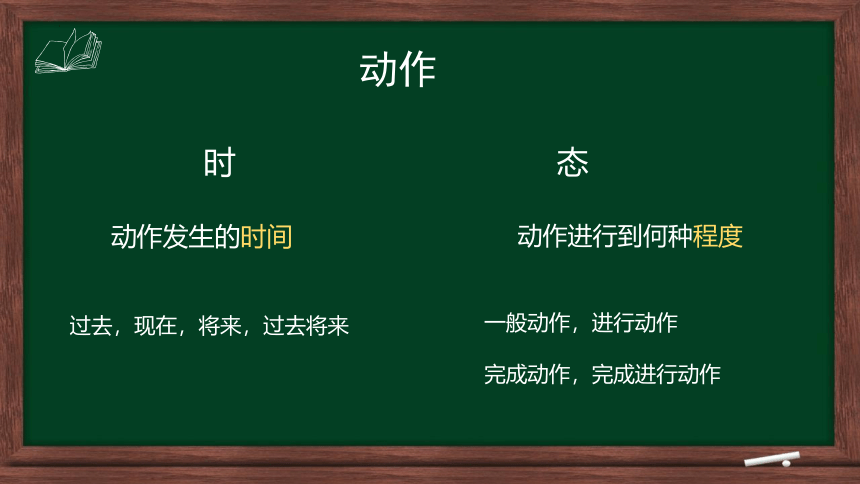
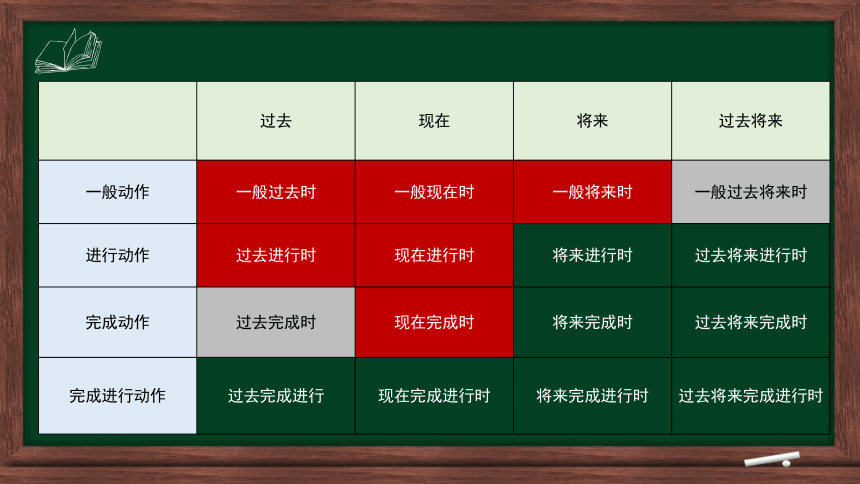
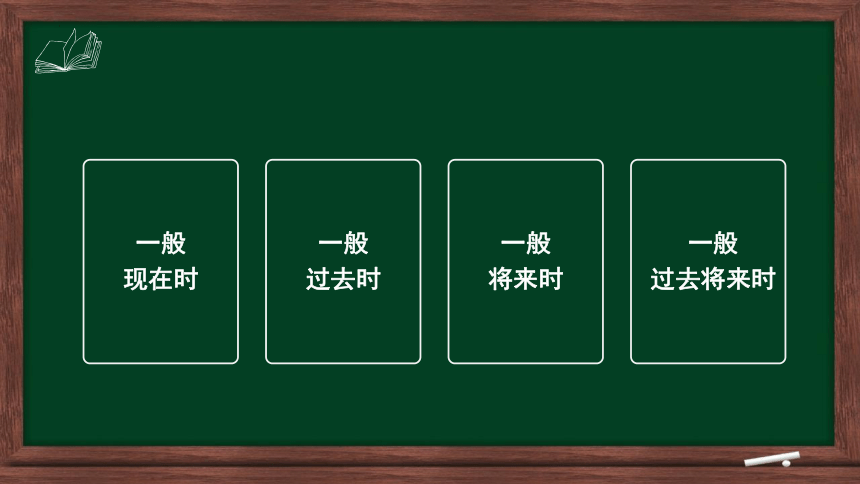
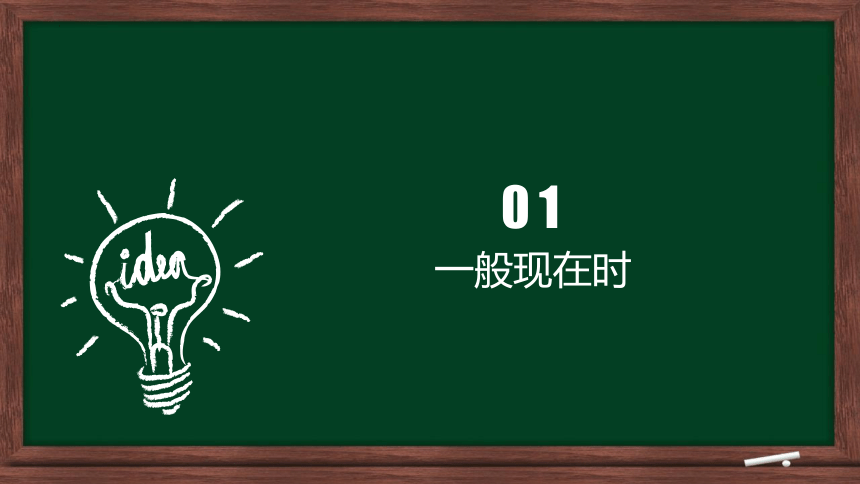
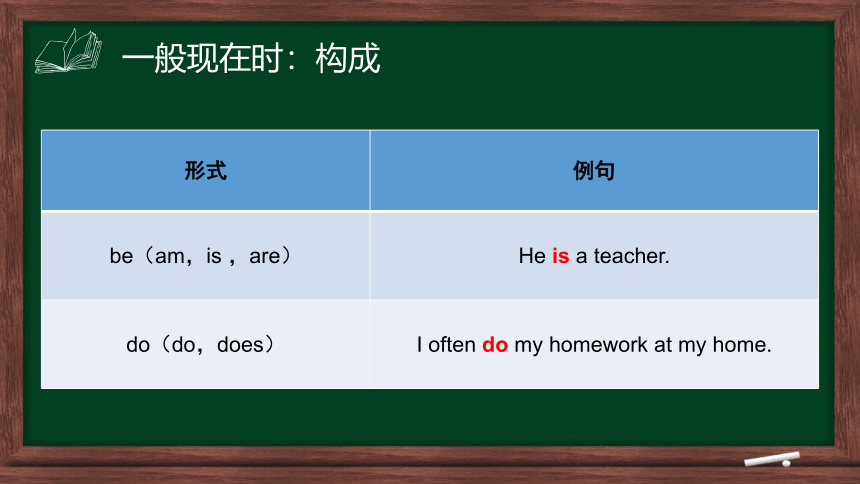
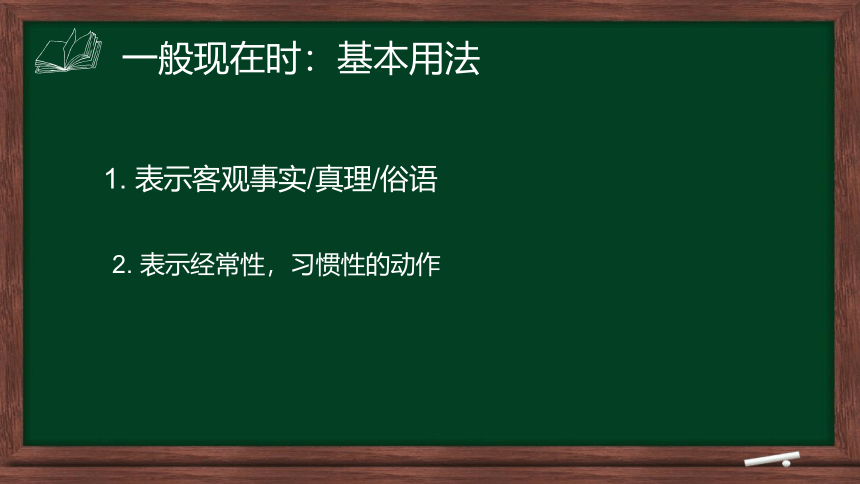
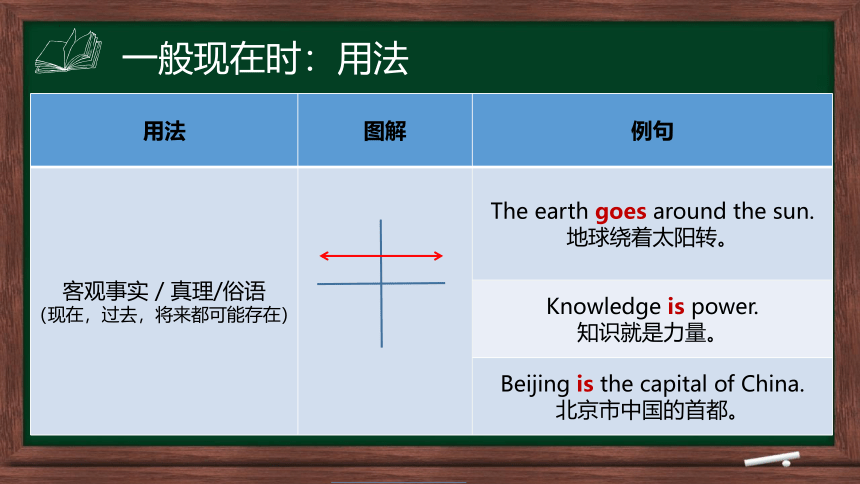
文档简介
(共42张PPT)
动词的五种基本形式
动词的五种基本形式
动词原形 play,sing,swim
plays,sings,swims
played,worked
playing,singing
过去分词 worked,played
第三人称单数
过去式
现在分词
1. 第三人称单数
一般+s read→reads work→works
pass→passes mix →mixes
watch→watches brush→brushes
do→does
try→tries
study→studies
以s,x,ch,sh,o结尾 +es
辅音+y y→ies
2. 过去式
一般+ed work→worked
like→liked
live→lived
try→tried
study→studied
重读闭音节结尾 词尾只有一个辅音字母 双写尾字母+ed stop→stopped
plan→planned
_e结构 +d
辅音+y y→ied
英文时态(一):一般时态
动作
时
态
动作发生的时间
动作进行到何种程度
过去,现在,将来,过去将来
一般动作,进行动作
完成动作,完成进行动作
过去 现在 将来 过去将来
一般动作 一般过去时 一般现在时 一般将来时 一般过去将来时
进行动作 过去进行时 现在进行时 将来进行时 过去将来进行时
完成动作 过去完成时 现在完成时 将来完成时 过去将来完成时
完成进行动作 过去完成进行 现在完成进行时 将来完成进行时 过去将来完成进行时
一般
现在时
一般
过去时
一般
将来时
一般
过去将来时
0 1
一般现在时
一般现在时:构成
形式 例句
be(am,is ,are) He is a teacher.
do(do,does) I often do my homework at my home.
一般现在时:基本用法
1. 表示客观事实/真理/俗语
2. 表示经常性,习惯性的动作
一般现在时:用法
用法 图解 例句
客观事实 / 真理/俗语 (现在,过去,将来都可能存在) The earth goes around the sun.
地球绕着太阳转。
Knowledge is power.
知识就是力量。
Beijing is the capital of China.
北京市中国的首都。
一般现在时:用法
用法 图解 例句
经常性,习惯性 动作 I often do my homework at my home.
我经常在家做作业。
He likes rice for dinner.
他晚饭喜欢吃米饭。
I usually get up at 8:00.
我通常八点起床。
频率的时间副词:
肯定:always,usually,often,sometimes,frequently,every day, once a week
否定:never,selodom,rarely
一般现在时:其他用法
3. 一般现在 → 正在发生的动作
4. 一般现在 → 将来发生的动作
一般现在时:其他用法
3. 一般现在 → 正在发生的动作
以there/here开头的句子→目前短暂的动作
Here comes your mother. 你妈妈过来了。
There_______(go) our bus. 我们要做坐的公交车开走了。
goes
一般现在时:其他用法
条件状语从句(if ,unless)
时间状语从句(when,as soon as,before,after)
I'll be glad if he comes over to visit me. 如果他过来看我,我会很开心的。
注意:if 翻译成是否时,要用一般将来时表将来。
4. 一般现在 → 将来发生的动作
I don't know if he will come to see me. 我不知道他是否会看我。
一般现在时:其他用法
时间状语从句(when,as soon as,before,after)
Please let me know when he comes back. 他回来时请告诉我。
4. 一般现在 → 将来发生的动作
I‘ll give the book to him as soon as I see him. 我一见到他就把书给他。
例题
1. My father____ his bike to work every day.
A. ride B. rode C. will ride D. rides
3. If it ____ tomorrow,I won't play with you.
A.is raining B.rains C. will rain D. rain
2. My brother is a teacher. He ___maths at a school.
A.teach B. teachs C.is teaching D.teaches
回顾:一般现在时
02
一般过去时
一般过去时:构成
形式 例句
be(was,were) He was angry just now.
他刚刚生气了。
do(did) I played basketball yesterday.
我昨天打篮球了。
一般现在时:用法
用法 图解 例句
过去特定时间 发生的动作或存在的状态。 I saw him just now.
我刚刚看见他了。
I was tired last night.
我昨晚很累。
I went to Beijing two years ago.
我两年前去过北京。
过去的时间状语
yesterday,yesterday evening / morning / afternoon
last night / year / week / month / spring / Sunday
three days / hours / months / years ago
the day before yesterday前天
the other day 前几天
just now 刚刚
一般现在时:用法
用法 图解 例句
过去 某一段时间 持续/反复发生的动作 I lived in Shenyang for ten years,but now I live in Beijing.
我在沈阳生活过十年,但是现在我在北京生活。
I slept for eight hours last night.
我昨晚睡了8小时。
He often helped me when I was a child.
他在我是还在的时候经常帮助我。
例题
1. My father____ his bike to work yesterday.
A. ride B. rode C. will ride D. rides
2. My mother was a teacher. He ___maths at a school ten years ago.
A.teach B. taught C.is teaching D.teaches
回顾:一般过去时
03
一般将来时
一般将来时
预测:说话的人认为将来会发生某事
事先计划: 说话人在说话之前已经决定要去做某事
意愿:说话当时立刻决定做某事。
一般将来时:构成
形式 例句
will/(I)shall do He will come to see me next week.
他明天要来看我。
I shall go to the park this afternoon.
今天下午我要去公园。
be going to do I am going to ski tomorrow.
我打算明天去滑雪。
一般将来时:用法
用法 图解 例句
表示 预测,估计。 (will / be going to) According to the weather report, It will be windy tomorrow.
明天将是个大风天。
According to the weather report, It is going to be windy tomorrow.
明天将是个大风天。
一般将来时:用法
用法 图解 例句
表示 事先计划 (be going to) I am going to visit my grandmother next week.
下周我打算去看我的姥姥。
一般将来时:用法
用法 图解 例句
表示 意愿 (will) A. The telephone is ringing.
B. I will answer it.
A. 电话铃响了。
B. 我去接。
表示预测时的区别:
区别 例句
be going to 根据明显迹象来推断 Look at those black clouds!It's going to rain.
看那些乌云!要下雨了。
will 认为/相信某件事要发生 I hope it will be warm tomorrow.
我希望明天会暖合起来。
一件事不受人的想法所改变。
只用will
我明天就55岁了。
I will be 55 years old tomorrow.
It will be the year of the mouse next year.
一般将来时的时间状语
tomorrow
next / year / week / month / / Sunday
in the future 将来
soon 一会儿
before long 不久后
this afternoon 今天下午
in 2020(+将来时间)
in .... minutes/hours/days... 在..之后
例题
1. Keep practising English and you ____ your English.
A.improve B. improved C. will improve D. are improving
2.- I want to know if you ____ boating with us tomorrow.
- If it ____ rain tomorrow,I will.
A.will go;will not
B.go;will not
C.will go;doesn't
D.go;doesn't
回顾:一般将来时
04
一般过去将来时
一般过去将来时
在过去某个时间点看将来要发生的动作。
一般过去时:构成
形式 例句
was / were going to He said he was going to play football.
他说他打算踢足球。
I didn't know if we were going to paly football.
我不知道我们是否去踢球。
would / should The children said they wouldn't play football in the street.
孩子们说他们不会在街上踢足球了。
一般过去时:用法
用法 图解 例句
从过去某一个时间看将要发生的动作/状态 She told us that she woud go with us.
她告诉我们她会跟我们一起去。
过去将来时必须要有一个参照物 → 一个发生在过去的动作。
1. Amy said she _____________________ the next day.
A. will come B. came C. has come D. would come
动词的五种基本形式
动词的五种基本形式
动词原形 play,sing,swim
plays,sings,swims
played,worked
playing,singing
过去分词 worked,played
第三人称单数
过去式
现在分词
1. 第三人称单数
一般+s read→reads work→works
pass→passes mix →mixes
watch→watches brush→brushes
do→does
try→tries
study→studies
以s,x,ch,sh,o结尾 +es
辅音+y y→ies
2. 过去式
一般+ed work→worked
like→liked
live→lived
try→tried
study→studied
重读闭音节结尾 词尾只有一个辅音字母 双写尾字母+ed stop→stopped
plan→planned
_e结构 +d
辅音+y y→ied
英文时态(一):一般时态
动作
时
态
动作发生的时间
动作进行到何种程度
过去,现在,将来,过去将来
一般动作,进行动作
完成动作,完成进行动作
过去 现在 将来 过去将来
一般动作 一般过去时 一般现在时 一般将来时 一般过去将来时
进行动作 过去进行时 现在进行时 将来进行时 过去将来进行时
完成动作 过去完成时 现在完成时 将来完成时 过去将来完成时
完成进行动作 过去完成进行 现在完成进行时 将来完成进行时 过去将来完成进行时
一般
现在时
一般
过去时
一般
将来时
一般
过去将来时
0 1
一般现在时
一般现在时:构成
形式 例句
be(am,is ,are) He is a teacher.
do(do,does) I often do my homework at my home.
一般现在时:基本用法
1. 表示客观事实/真理/俗语
2. 表示经常性,习惯性的动作
一般现在时:用法
用法 图解 例句
客观事实 / 真理/俗语 (现在,过去,将来都可能存在) The earth goes around the sun.
地球绕着太阳转。
Knowledge is power.
知识就是力量。
Beijing is the capital of China.
北京市中国的首都。
一般现在时:用法
用法 图解 例句
经常性,习惯性 动作 I often do my homework at my home.
我经常在家做作业。
He likes rice for dinner.
他晚饭喜欢吃米饭。
I usually get up at 8:00.
我通常八点起床。
频率的时间副词:
肯定:always,usually,often,sometimes,frequently,every day, once a week
否定:never,selodom,rarely
一般现在时:其他用法
3. 一般现在 → 正在发生的动作
4. 一般现在 → 将来发生的动作
一般现在时:其他用法
3. 一般现在 → 正在发生的动作
以there/here开头的句子→目前短暂的动作
Here comes your mother. 你妈妈过来了。
There_______(go) our bus. 我们要做坐的公交车开走了。
goes
一般现在时:其他用法
条件状语从句(if ,unless)
时间状语从句(when,as soon as,before,after)
I'll be glad if he comes over to visit me. 如果他过来看我,我会很开心的。
注意:if 翻译成是否时,要用一般将来时表将来。
4. 一般现在 → 将来发生的动作
I don't know if he will come to see me. 我不知道他是否会看我。
一般现在时:其他用法
时间状语从句(when,as soon as,before,after)
Please let me know when he comes back. 他回来时请告诉我。
4. 一般现在 → 将来发生的动作
I‘ll give the book to him as soon as I see him. 我一见到他就把书给他。
例题
1. My father____ his bike to work every day.
A. ride B. rode C. will ride D. rides
3. If it ____ tomorrow,I won't play with you.
A.is raining B.rains C. will rain D. rain
2. My brother is a teacher. He ___maths at a school.
A.teach B. teachs C.is teaching D.teaches
回顾:一般现在时
02
一般过去时
一般过去时:构成
形式 例句
be(was,were) He was angry just now.
他刚刚生气了。
do(did) I played basketball yesterday.
我昨天打篮球了。
一般现在时:用法
用法 图解 例句
过去特定时间 发生的动作或存在的状态。 I saw him just now.
我刚刚看见他了。
I was tired last night.
我昨晚很累。
I went to Beijing two years ago.
我两年前去过北京。
过去的时间状语
yesterday,yesterday evening / morning / afternoon
last night / year / week / month / spring / Sunday
three days / hours / months / years ago
the day before yesterday前天
the other day 前几天
just now 刚刚
一般现在时:用法
用法 图解 例句
过去 某一段时间 持续/反复发生的动作 I lived in Shenyang for ten years,but now I live in Beijing.
我在沈阳生活过十年,但是现在我在北京生活。
I slept for eight hours last night.
我昨晚睡了8小时。
He often helped me when I was a child.
他在我是还在的时候经常帮助我。
例题
1. My father____ his bike to work yesterday.
A. ride B. rode C. will ride D. rides
2. My mother was a teacher. He ___maths at a school ten years ago.
A.teach B. taught C.is teaching D.teaches
回顾:一般过去时
03
一般将来时
一般将来时
预测:说话的人认为将来会发生某事
事先计划: 说话人在说话之前已经决定要去做某事
意愿:说话当时立刻决定做某事。
一般将来时:构成
形式 例句
will/(I)shall do He will come to see me next week.
他明天要来看我。
I shall go to the park this afternoon.
今天下午我要去公园。
be going to do I am going to ski tomorrow.
我打算明天去滑雪。
一般将来时:用法
用法 图解 例句
表示 预测,估计。 (will / be going to) According to the weather report, It will be windy tomorrow.
明天将是个大风天。
According to the weather report, It is going to be windy tomorrow.
明天将是个大风天。
一般将来时:用法
用法 图解 例句
表示 事先计划 (be going to) I am going to visit my grandmother next week.
下周我打算去看我的姥姥。
一般将来时:用法
用法 图解 例句
表示 意愿 (will) A. The telephone is ringing.
B. I will answer it.
A. 电话铃响了。
B. 我去接。
表示预测时的区别:
区别 例句
be going to 根据明显迹象来推断 Look at those black clouds!It's going to rain.
看那些乌云!要下雨了。
will 认为/相信某件事要发生 I hope it will be warm tomorrow.
我希望明天会暖合起来。
一件事不受人的想法所改变。
只用will
我明天就55岁了。
I will be 55 years old tomorrow.
It will be the year of the mouse next year.
一般将来时的时间状语
tomorrow
next / year / week / month / / Sunday
in the future 将来
soon 一会儿
before long 不久后
this afternoon 今天下午
in 2020(+将来时间)
in .... minutes/hours/days... 在..之后
例题
1. Keep practising English and you ____ your English.
A.improve B. improved C. will improve D. are improving
2.- I want to know if you ____ boating with us tomorrow.
- If it ____ rain tomorrow,I will.
A.will go;will not
B.go;will not
C.will go;doesn't
D.go;doesn't
回顾:一般将来时
04
一般过去将来时
一般过去将来时
在过去某个时间点看将来要发生的动作。
一般过去时:构成
形式 例句
was / were going to He said he was going to play football.
他说他打算踢足球。
I didn't know if we were going to paly football.
我不知道我们是否去踢球。
would / should The children said they wouldn't play football in the street.
孩子们说他们不会在街上踢足球了。
一般过去时:用法
用法 图解 例句
从过去某一个时间看将要发生的动作/状态 She told us that she woud go with us.
她告诉我们她会跟我们一起去。
过去将来时必须要有一个参照物 → 一个发生在过去的动作。
1. Amy said she _____________________ the next day.
A. will come B. came C. has come D. would come
同课章节目录
- 词法
- 名词
- 动词和动词短语
- 动词语态
- 动词时态
- 助动词和情态动词
- 非谓语动词
- 冠词
- 代词
- 数词和量词
- 形容词副词及其比较等级
- 介词和介词短语
- 连词和感叹词
- 构词法
- 相似、相近词比较
- 句法
- 陈述句
- 一般疑问句和否定疑问句
- 特殊疑问句及选择疑问句
- 反意疑问句
- 存在句(There be句型)
- 宾语从句
- 定语从句
- 状语从句
- 主谓一致问题
- 简单句
- 并列句
- 复合句
- 主谓一致
- 主、表语从句
- 名词性从句
- 直接引语和间接引语
- 虚拟语气
- 感叹句
- 强调句
- 倒装句
- 祈使句
- 句子的成分
- 句子的分类
- 题型专区
- 单项选择部分
- 易错题
- 完形填空
- 阅读理解
- 词汇练习
- 听说训练
- 句型转换
- 补全对话
- 短文改错
- 翻译
- 书面表达
- 任务型阅读
- 语法填空
- 其他资料
